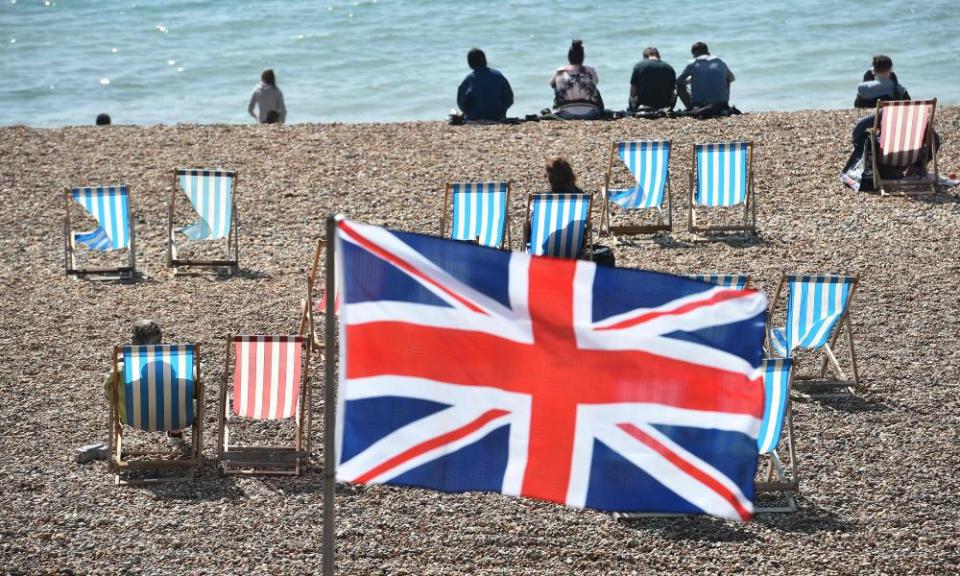Brexit economy: outlook positive but rocky negotiations could bring instability

Ministers are preparing for crucial Brexit talks this autumn against a backdrop of better news on jobs, inflation and the public finances as the UK economy displays signs of stability after a volatile start to the year, a Guardian analysis shows.
The Guardian’s monthly tracker of economic news shows inflation coming close to its peak and the lowest levels of unemployment since the mid-1970s. However, the ever-present threat that rocky negotiations could knock business confidence, derailing the economy, remains.
The latest inflation figures confounded City economists’ expectations for prices to resume an upward trajectory after an unexpected drop in June, while the UK also reported a surprise budget surplus in July, the first positive outturn for the nation’s finances in that month since 2002. Meanwhile, spending on food helped to support growth in retail sales, despite a drop in spending across all other sectors, as consumers exercise more caution amid a squeeze on household budgets.
But despite the positive signs for UK, defying the gloomiest forecasts before the referendum for a Brexit recession, clouds are gathering as ministers prepare for more talks with Brussels after a summer lull.
Two senior economics commentators have warned that the long-term outlook remains bleak. Writing in the Guardian, Andrew Sentance, a former member of the Bank of England’s monetary policy committee, said Britain appeared to be missing out on higher levels of growth seen elsewhere in Europe.
“We would expect a recovery in the other EU economies to benefit the UK. Because of Brexit, growth in the UK and other EU economies are now moving in opposite directions,” said Sentance, a senior economic adviser at PricewaterhouseCoopers.
Eurozone GDP rose by 0.6% in the three months to June, twice as fast as the UK’s in the second quarter of 2017, underlining the currency bloc’s recovery from the depths of the Greek debt crisis. On an annual basis, the eurozone expanded by 2.3% during the quarter, compared with 1.7% in the UK.
To gauge the impact of the Brexit vote on a monthly basis, the Guardian has chosen eight economic indicators, along with the value of the pound and the performance of the FTSE 100.
The dashboard for July shows a further deterioration in the value of the pound amid a bleak mood over the prospects for the UK economy, against an improving picture in Europe, pushing sterling to a more than 10-month low against the euro. While the dollar has suffered due to political turbulence in Washington, sterling is now resuming a downward slide against the greenback.
Britain’s trade position with the rest of the world worsened in June, according to the latest figures this month, adding impetus for ministers pushing the country’s future trading relationships higher up the agenda with Brussels. The figures from the ONS suggest the sharp fall in the value of the pound has so far failed to lift sales of UK-made goods abroad.
Some free market economists have argued the UK would not be faced with disaster if Theresa May fails to secure a trade deal with Europe, including those at the Institute for Economic Affairs thinktank, who advocate trade with the rest of the world over a “hamstrung” deal with Brussels.
But writing in the Guardian, David Blanchflower, another former Bank of England policymaker, said such claims did not match the view of most economists, who say Britain is worse off with Brexit.
“The claims by some rightwing economists that a free trade nirvana will emerge if there is a hard Brexit has been rightly met this week by incredulity by the economics profession,” said Blanchflower, a professor of economics at Dartmouth College in the US.
There are signs that the effects of the pound’s slump on inflation may be beginning to fade, providing some relief to households put under pressure in recent months. The consumer price index (CPI) remained static at 2.6% in July, helped by a drop in the price of petrol, which offset upward pressure from import-sensitive goods and services such as clothing, household goods and food and drink.
Despite the encouraging data in the last couple of months, economists believe the drop in sterling is yet to fully wash through the economy, while the Bank of England expects CPI to reach 3% later in the year. “Fundamentally we suspect we’ve got further effects from the fall in sterling to come through into the high street,” said Philip Shaw, an economist at the banking group Investec.
Rail fares are set for the steepest annual increase in the past five years, after the government set prices for commuters at July’s 3.6% increase in the retail price index, which is typically a higher measure of prices than CPI. Further price rises ahead will further harm living standards and household budgets, putting more pressure on the economy. “The main driver behind this has been the Brexit vote which lowered the pound and increased prices,” said Blanchflower.
Although there are signs of UK pay growth, as record low levels of unemployment potentially boost workers’ bargaining power, real wages remain negative for the third month in a row. Real pay was down 1.4% between April and June, contributing to a sharp fall in living standards.
Meanwhile, unemployment could rise over the next year as the economy slows, with the potential to be further hurt by Brexit, according to Sentance.
“Over the recovery following the global financial crisis, the UK has been one of the better-performing economies until now. That may now be about to change, as other EU economies gather momentum and the UK economy falters,” he said.

 Yahoo Finance
Yahoo Finance 